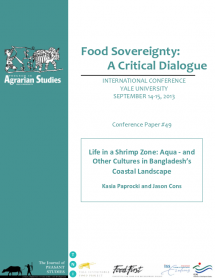Life in a Shrimp Zone Aqua- and Other Cultures in Bangladesh’s Coastal Landscape
What are the class-differentiated implications of food sovereignty in a zone of ecological crisis—Bangladesh’s coastal Khulna district? Much land in this deltaic zone that had previously been employed for various forms of peasant production has been overrun and transformed by the introduction of brackish-water shrimp aquaculture.

Authors
This paper questions the possibilities of food sovereignty for producing a radical egalitarian politics. Specifically, it explores the class-differentiated implications of food sovereignty in a zone of ecological crisis—Bangladesh’s coastal Khulna district. Much land in this deltaic zone that had previously been employed for various forms of peasant production has been overrun and transformed by the introduction of brackish-water shrimp aquaculture. This has, in turn, caused massive depeasantization and ecological crisis throughout the region. Drawing on participatory research conducted in the summer of 2013, we explore the human impacts of this transformation. Through an examination of two markedly different Polders (embanked islands)—one which has been overrun by shrimp production and one that has resisted it—we ask how coastal communities have variously negotiated their rapidly changing ecologies and food systems based on their relative class position and access to land. Comparing these distinct cases, we highlight the multiple meanings that peasants from different classes ascribe not just to shrimp, but also to broader questions of adaptation, community, and life in uncertain terrains. We show that while food sovereignty in non-shrimp areas has averted the depeasantization affecting shrimp areas, it does not necessarily yield greater equality in agrarian class relations. To achieve such ends, we suggest, the dynamics of land sovereignty provide a critical and necessary corollary to self-determination in agricultural production.
Kasia Paprocki is a PhD student in Development Sociology, Cornell University. Ms. Paprocki’s research broadly is concerned with the relationship between development and agrarian dispossession in Bangladesh. Working in partnership with Nijera Kori, Bangladesh’s largest landless social movement, her dissertation research is examining depeasantization through industrial shrimp aquaculture and related rural development schemes, and the ways in which it is shaped by discourses around climate change and market-based development solutions.
Jason Cons is an Assistant Professor of International Relations, Bucknell University. Professor Cons’s research focuses on the India-Bangladesh border and on agrarian change in rural Bangladesh.
Food Sovereignty: a critical dialogue, 14 - 15 September, New Haven.